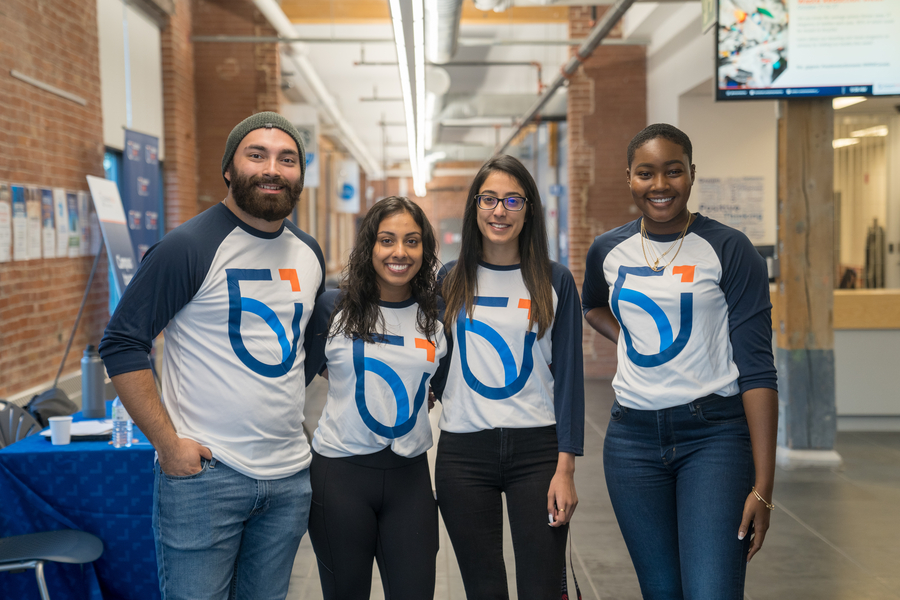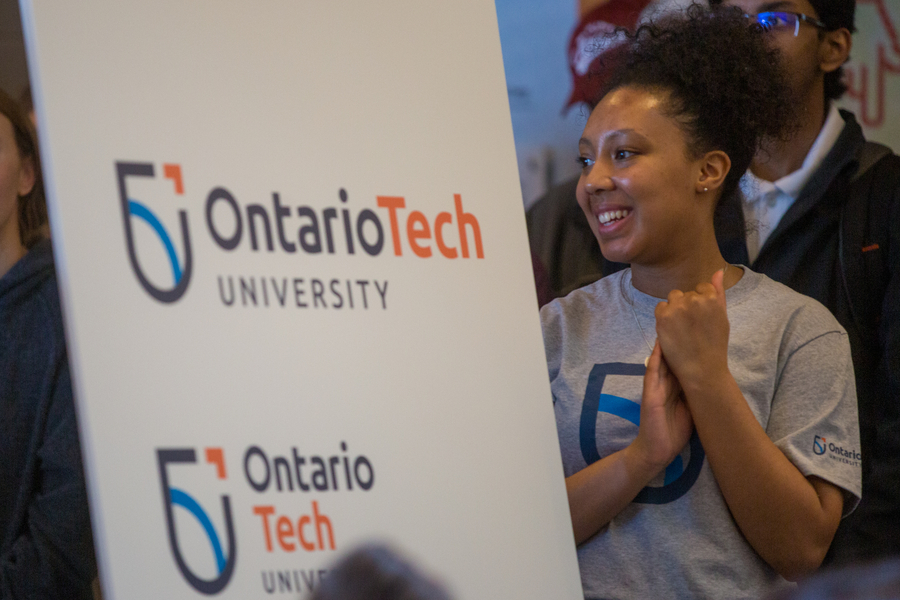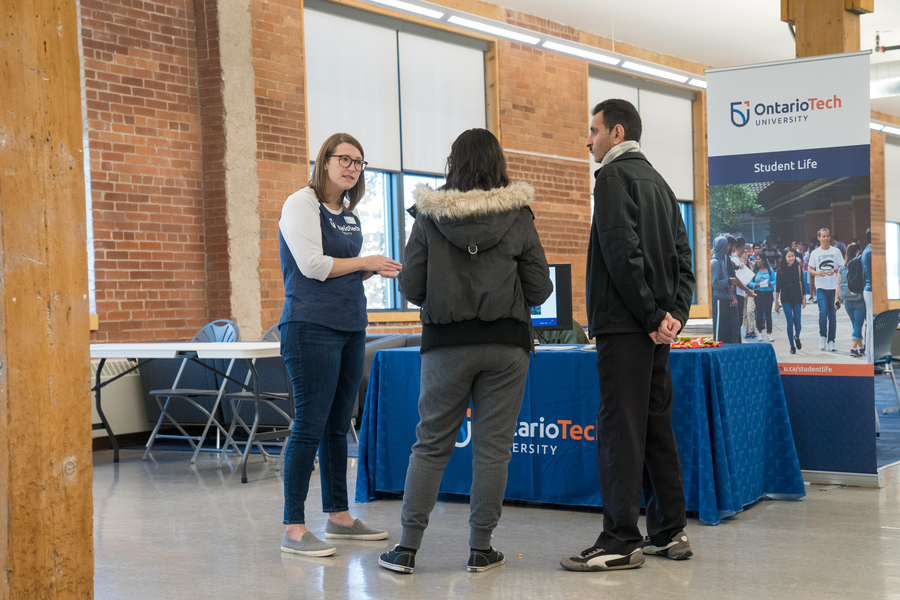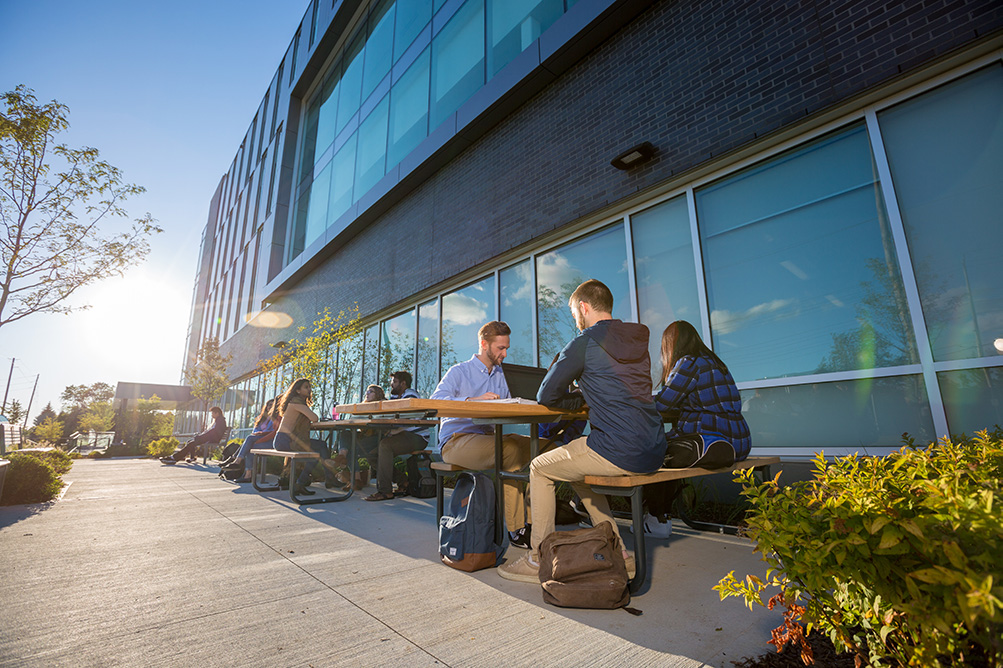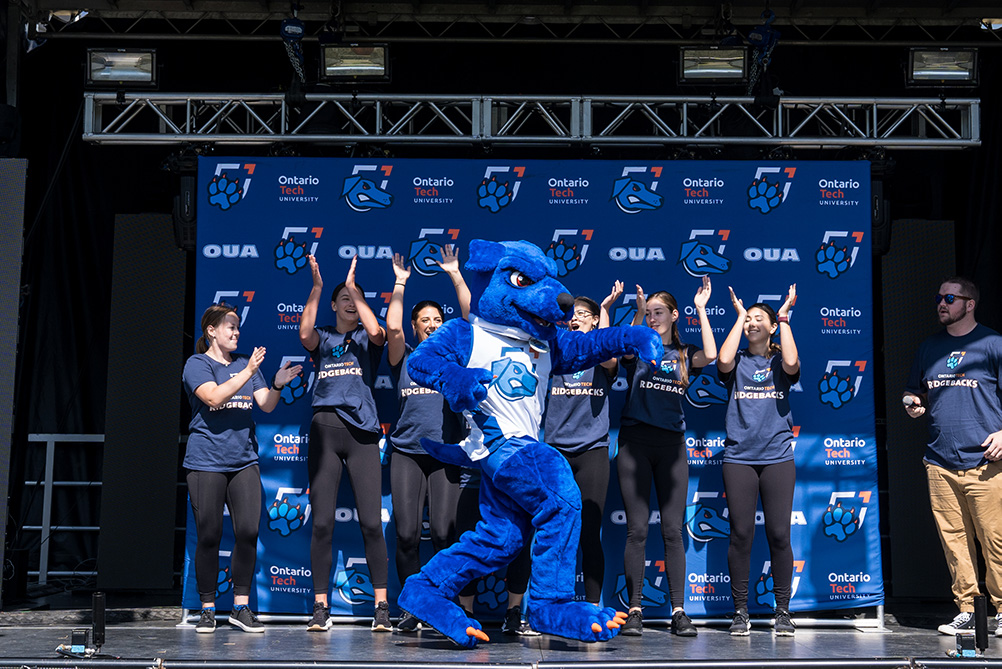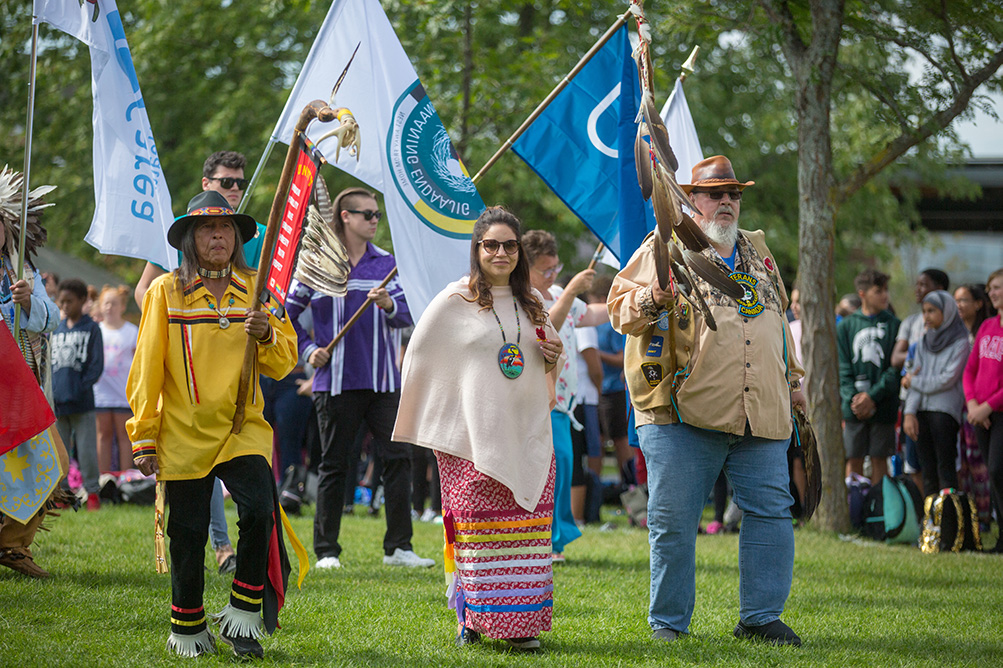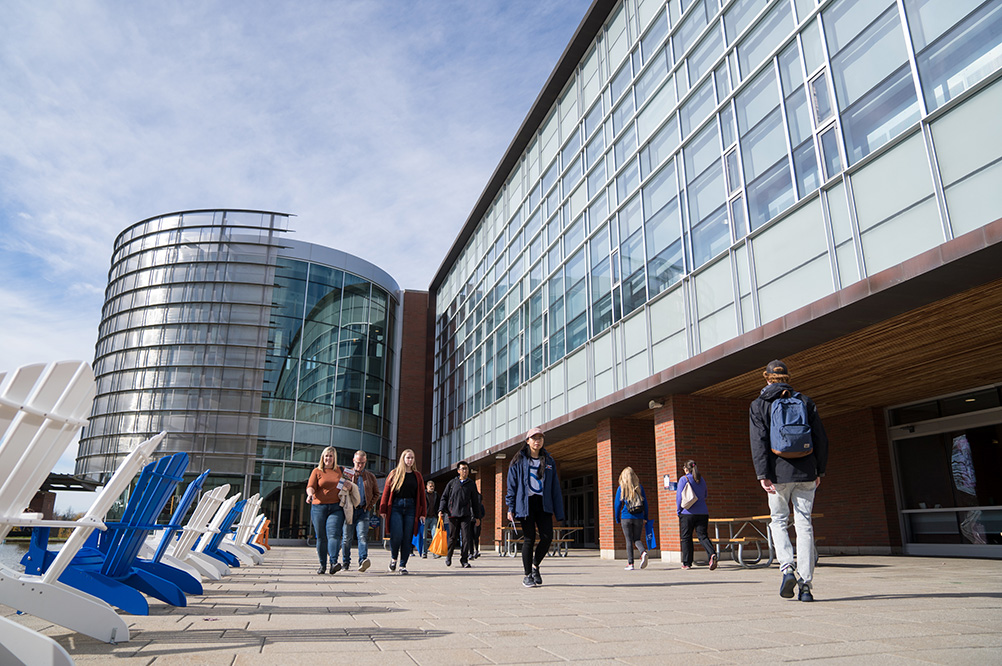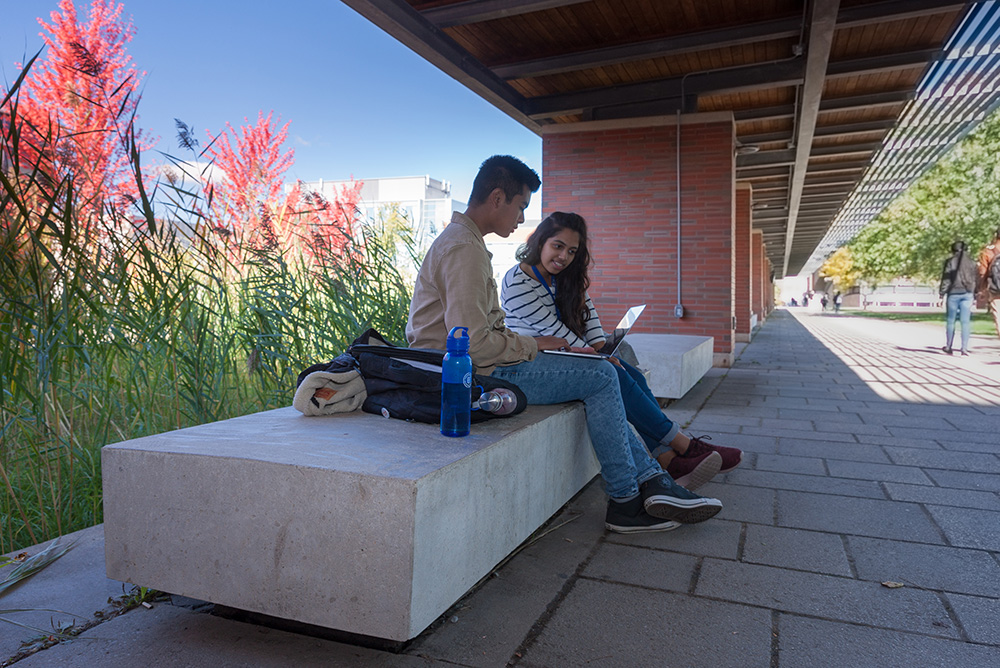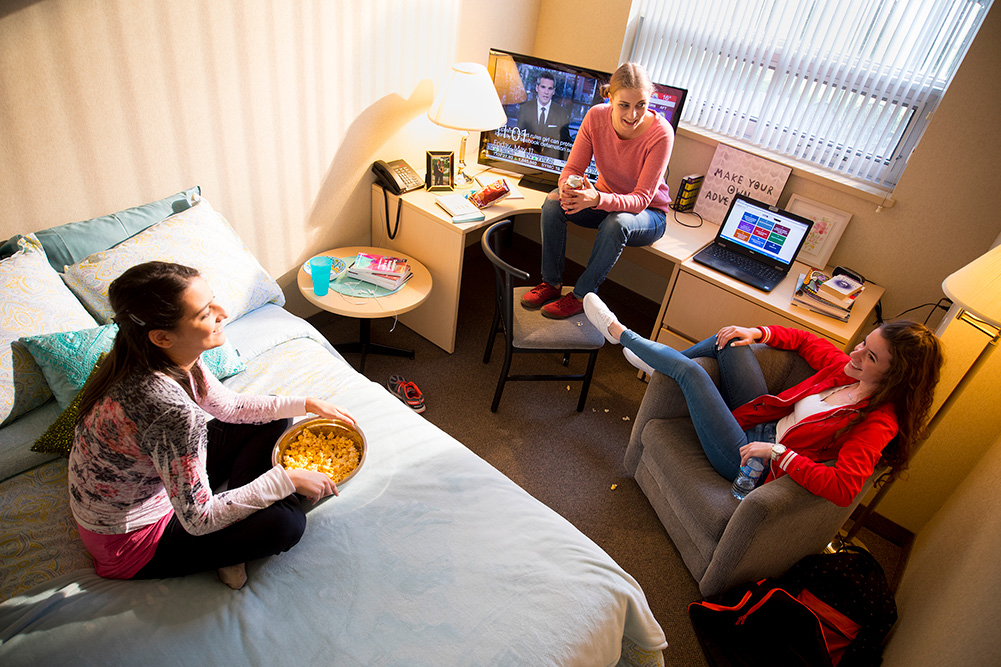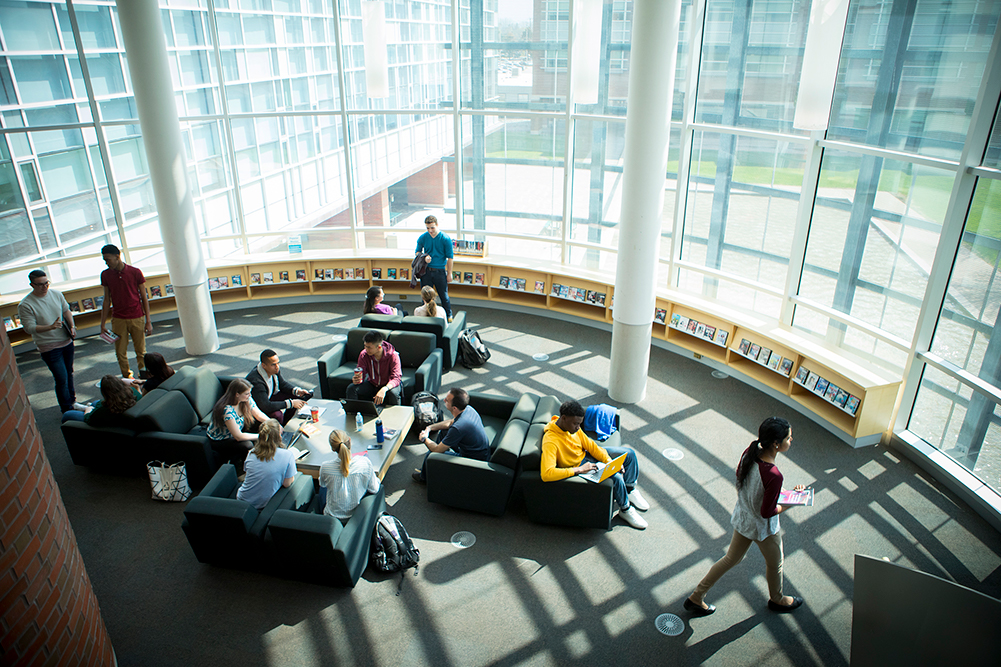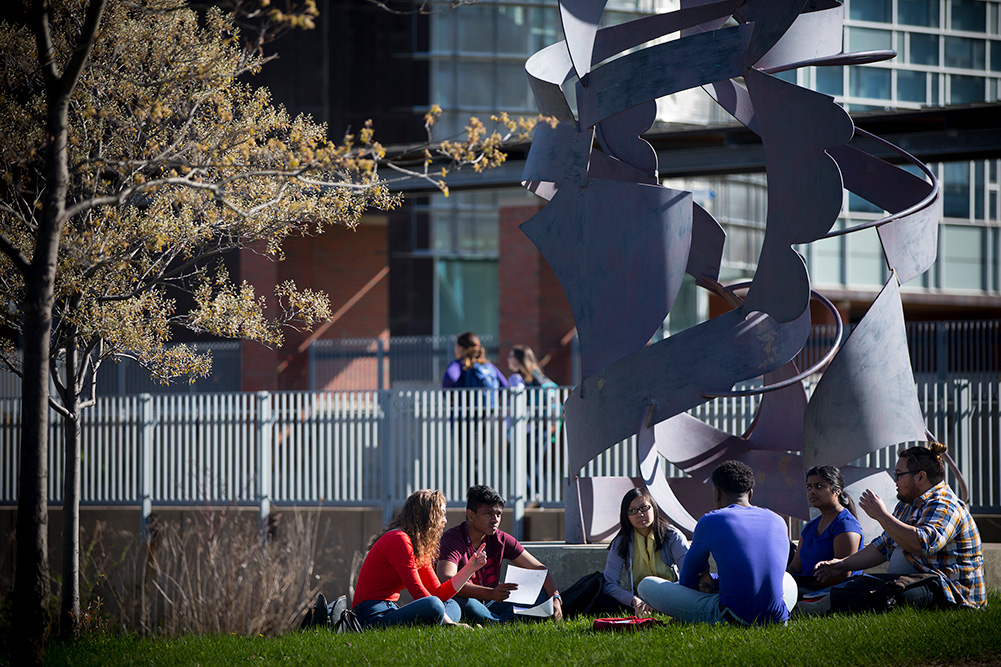Student Life
Ontario Tech celebrates the diversity of our community which serves to enrich all aspects of university life—academically, socially and culturally.
The Office of Student Life supports this diversity through programming and activities that acknowledge the talents, interests and cultures of our students. Student Life provides specialized support for students living with disabilities, Indigenous students, international students, online students, and mature, transfer and pathways students.
Frequently asked questions
General
-
What is Student Life?
Student Life is a university department that provides out-of-the-classroom support and services for students. It’s the part of your campus community that is devoted to making sure your university journey is rewarding and successful. You’ll find a supportive, professional team that can help you build new connections with your peers, strengthen your academic and leadership skills, improve your health and well-being, and help you prepare for a great career when you graduate.
Our services and programs are available online and in-person. For more information visit ontariotechu.ca/studentlife. -
When should I start preparing for university?
As soon as you accept your offer of admission to Ontario Tech, you should check your ontariotechu.net email account to learn about your next steps and plan to attend the MyStart orientation programming, starting in July.
-
How do I find out about services for students with disabilities?
Student Accessibility Services (SAS) works with students with disabilities to arrange academic accommodations to support them in their studies. This may include assistive technologies, access to course material in alternate formats, or one-on-one support.
Once you have accepted your offer of admission, get in touch with SAS by emailing studentaccessibility@ontariotechu.ca to make an appointment and explore next steps.
-
What if I’m having difficulty keeping up with everything?
If you're having difficulty keeping up, there are many peer supports and programs that Student Life provides to help with academics, social adjustment to university life, community involvement, career planning and more.
Visit ontariotechu.ca/studentlife to learn more.
-
What mental health services are available?
There is support for students experiencing academic challenges caused by personal, physical or emotional difficulties through a range of short-term counselling and therapy services using a 'Stepped Care' model to provide service that is appropriate to individual need. There is no charge for these services.
Visit ontariotechu.ca/mentalhealth for more information. -
Why should I attend Orientation?
Every student will have a different experience attending Orientation, but across the board, students say it helped them make friends and reduced their nervousness about going into the new situation of university life. You can make your experience unique to you and MyStart is a great foundation!
Visit ontariotechu.ca/orientation for more information.
-
What is my first year going to be like and how will it be different than high school?
You'll have a lot more flexibility with your time and work, but that means more responsibility.
You’ll have to keep on top of your own deadlines and work planning, which means you can find the schedule that works for you and balances your academic, social, family and professional life.
-
How do I get involved and meet new people?
You can meet new people at Orientation, by joining clubs and student groups, writing for the Digital Community, joining health and wellness activities, or by joining a learning community. You’ll be assigned a peer leader who can help you find the involvement opportunity that’s right for you.
Community
-
Who can help me adjust to university life?
All incoming first-year students are paired up with a peer leader—an upper-year student who can help you navigate your first year at university. They've been through it and are trained on the supports and services available to students, and how best to access them.
-
What supports are available for equity-seeking groups?
We offer a variety of support, such as our Let’s Talk Equity talks and groups, our Student-Centered Spaces groups, and our Respecting Individuals and Supporting Equity workshop series. There are also committees you can get involved with to advise the university and influence policies and programs.
You are encouraged to get involved and join the Equity Advocates–a group of student volunteers who develop initiatives to support equity-seeking groups and to inform the campus community on equity-related topics.
You can also connect with the Equity and Inclusivity Advisor, who is an employee at the university that is available to support you.
Visit ontariotechu.ca/equity to explore more.
-
What programs and services are available through Indigenous Education and Cultural Services (IECS) and do I have to be Indigenous to access them?
IECS offers a variety of programs and services including but not limited to cultural workshops, mental health counselling, a safe and inclusive space for students and cultural advising. These services are available to all students - you do not have to be Indigenous to access them.
Visit ontariotechu.ca/indigenous for more information.
-
I am Indigenous but do not have a status card, can I participate in Indigenous events?
Yes, all Indigenous students, whether you are status or non-status, are welcome to participate. We want you to feel that our campus spaces, programs and services are a home away from home for you. Non-Indigenous students are also welcome.
Visit ontariotechu.ca/indigenous for more information. -
Are there Indigenous courses at Ontario Tech University?
Yes, many programs offer courses with Indigenous content. The Faculty of Social Science and Humanities offers an elective course, Introduction to Indigenous Studies, that is available to all students.
Visit ontariotechu.ca/indigenous for more information.
-
How can I self-identify as an Indigenous student?
Indigenous (Status and non-Status First Nation, Métis and/or Inuit) students at the university are encouraged to complete an Indigenous Self-Identification form, or contact indigenous@ontariotechu.ca directly, so that we can best support you through your academic studies, and provide you with information about special events and activities.
-
Is there an Indigenous Admissions Policy?
Yes, learn more on the Indigenous Students Admissions page.
Student Accessibility Services (SAS)
-
How do I know if I need academic accommodations?
If you're unsure about whether or not registration with SAS is necessary, we recommend you contact our office or schedule an initial intake appointment with one of our accessibility and accommodations specialists to discuss your concerns.
We also suggest that you review our academic accommodations web page to get a sense of what SAS offers. Find out whether or not you're eligible for services and support by reviewing the documentation requirements page.
There may be other circumstances that have occurred which warrant academic accommodation on a temporary basis. If you experience functional impairments as a result of a temporary condition, such as acquiring a serious virus or infection, breaking your dominant arm or hand, experiencing an acute mental health crisis or get a concussion, contact SAS to determine support and planning.
-
I need accommodations. How do I get an appointment?
Visit our incoming students' page for more information about the steps to register with SAS.
-
I am starting in September. When should I book my intake appointment?
Intake appointments will be available beginning in July.
To book an intake appointment, email studentaccessibility@ontariotechu.ca.
-
What accommodations will I receive?
The development of an academic accommodation plan is highly individualized and based on an in-depth understanding of your functional limitations related to your disability.
Your accommodation plan will be determined after a careful review of the information and recommendations related to functional limitations, that was provided by a registered health professional. These plans can be changed or updated as needed based on your symptoms, with supporting medical documentation.
-
What if I have multiple diagnoses? What form should I have my doctor fill out?
Choose the documentation form that most applies to the functional limitations you experience most frequently. Your medical professional can list all other diagnoses on the same form, as well as the impacts of those diagnoses.
You may complete multiple forms if you feel that that is necessary to provide all the relevant information, but only one is required.
-
Do I need an updated psychoeducational assessment?
You may require an updated psychoeducational assessment to confirm a learning disability diagnosis, depending on how recently your last assessment was completed. Please review the documentation requirements for psychological or neuropsychological assessments.
You're encouraged to book an appointment with an accessibility and accommodations specialist to review your documentation together and determine what next steps—if any—are required.
Learn more about SAS documentation on our incoming students' web page.
-
How will I pay for a new psychoeducational assessment?
If you're eligible for OSAP, you may qualify for a bursary to cover some or all of the cost.
If you're not eligible for OSAP, you may qualify for a sliding-scale fee for service rate based on income. If you need an updated assessment, discuss this with your accessibility and accommodations specialist at your intake appointment to determine what options are available to you.
-
I have an Individualized Education Program (IEP). Is that what you need?
If you have an IEP in high school, it's recommended that you make an appointment with an accessibility and accommodations specialist to review your IEP. You will need additional documentation regarding the diagnosis listed in your IEP (e.g. a psychoeducational assessment).
If you do not have additional documentation, your accessibility and accommodations specialist can advise and support you in getting what you need; interim accommodations may be provided while additional documentation is obtained.
-
Do you offer any orientation or transition programming?
Yes! Visit our orientation and transition page for more information.
SAS invites incoming students with documented disabilities to attend MyStart: Accessibility. Students who have attended these workshops in previous years report feeling better prepared and are more successful in the first few months of university. In addition to providing an opportunity to interact with other new students, this program will help you understand the real differences between high school and university, learn about self-advocacy, how to use your strengths and let you interact with key staff who can provide academic and learning support.
MyStart: Accessibility takes place in late summer. Parents and families are also invited to attend an information event in August.
Student Learning Centre
-
What does the Student Learning Centre do?
The Student Learning Centre offers academic support services to all students. Academic Subject Specialists and Peer Tutors provide support in one-on-one appointments, study halls, workshops or study groups in a variety of topics including, math, writing, physics, engineering, chemistry, English as a Second Language and more.
Visit ontariotechu.ca/studentlearning for more information.
-
How much does it cost to use the Student Learning Centre services?
There is no cost to use the Student Learning Centre.
-
Can I expect the same from an Academic Subject Specialist or Peer Tutor as from a Professor or TA?
Students that utilize academic support services will develop learning skills and study strategies to assist them while working through difficult concepts and topics learned in class.
Professors and TAs are always the first points of contact when learning in class, while academic specialists and peer tutors provide students with review and practice outside class through workshops and one-on-one appointments.
Visit ontariotechu.ca/studentlearning for more information.
-
Can I get someone to proofread my paper before I hand it in?
Writing Specialists will ask questions and provide feedback about your paper to help your writing structure, arguments and style. They do not simply proofread your paper for mistakes; be sure to proofread your paper before your appointment.
-
Do you have tutoring available?
Peer tutoring is available from upper-year, high achieving students as well as professional, full-time Academic Subject Specialists. You can get a one-on-one appointment, join a learning community, attend workshops or join a study group.
Visit ontariotechu.ca/studentlearning for more information.
-
How do I cope with test anxiety?
You can book an appointment with the Student Learning Centre to learn about study skills and testing strategies, as well as attend workshops and events designed to provide you with academic success skills.
Visit ontariotechu.ca/studentlearning for more information.
-
What can I do to be successful in my courses?
MyStart is a great way to start. This summer transition program will help you develop the foundational academic skills and strategies to succeed in your program. There is also ongoing support available for tutoring and academic success strategies through the Student Learning Centre.
-
English is not my first language. Can you help?
Yes! Specialized writing and English as an Additional Language (EAL) support is available by appointment, through workshops, and through online resources. There is also a community of domestic and international students who meet regularly to practice English, and share their culture and experiences called Conversation Café.
Visit ontariotechu.ca/studentlearning for more information.
-
Is there help for Math and STEM courses?
You can get academic support in math, physics, chemistry, engineering and other STEM courses through workshops, virtual study halls, appointments as well as online resources on nool.ca.
Visit ontariotechu.ca/studentlearning for more information.
Career Centre
-
Will you edit my cover letter and resumé?
An Employment Advisor can help you target your cover letter and resumé to specific opportunities in your field, and for specific positions.
Visit ontariotechu.ca/careercentre for more information.
-
How does the Career Centre connect me with employers?
As a student, and even once you graduate, you will be able to access job opportunities through the Student Life Portal. The Career Centre hosts multiple career fairs on campus where employers come to campus to discuss employment opportunities, and our employment advisors are available to support you in your job search.
-
Can you help me find a part-time job?
The Career Centre can help you find a part-time job, a co-op or internship, a full-time job after graduation, and can support you in applying for post-graduation further education opportunities.
Visit ontariotechu.ca/careercentre for more information.
-
Will the work-integrated learning experience be paid?
Work-integrated learning experiences such as co-ops, internships, practicums and placements may be paid, given academic credit, or both. The Career Centre can help you find an opportunity that meets your goals and academic requirements.
-
Why are work-integrated learning experiences important?
Graduating from university and starting your career is an important life event. Having previous work experience through work-integrated learning can help you stand out. The Career Centre can help you find opportunities that meet your career goals.
Visit ontariotechu.ca/careercentre for more information.
-
How can a Career Counsellor help me?
Career counsellors take a guiding and exploratory approach to help students and graduates understand who they are and how they fit into the world of work. If you are unsure of what you want to do, they can help you explore your skills, interest areas, hopes for the future and/or what is important to you.
Visit ontariotechu.ca/careercentre for more information.

